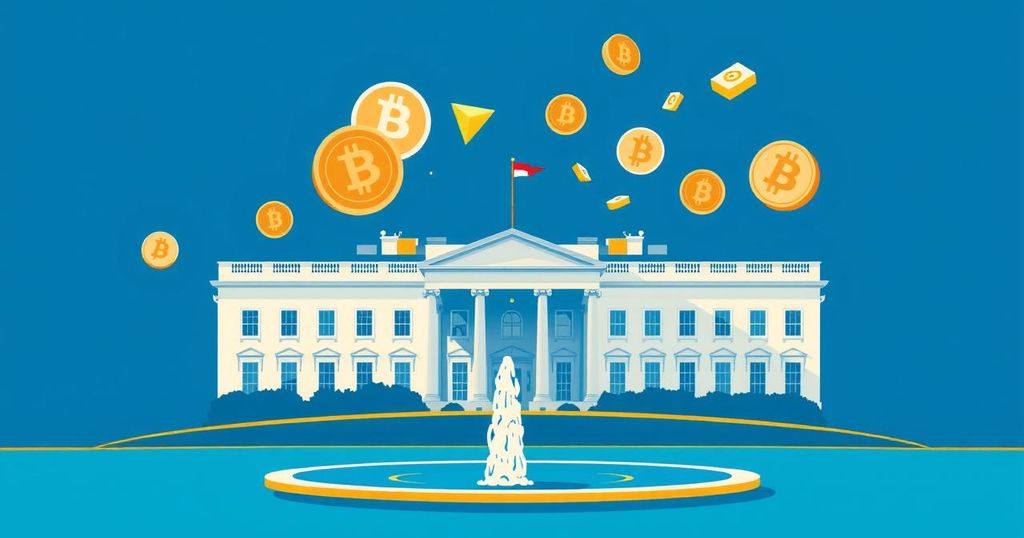Senate Vote Looms on Crypto Bill Possibly Benefitting Trump Family
Senate Republicans are preparing a vote on the GENIUS Act, a cryptocurrency bill that could significantly benefit president Trump’s crypto interests, particularly the USD1 stablecoin. While initially gaining bipartisan support, Democratic backing is wavering due to ethical concerns about Trump’s involvement. Negotiations are ongoing about anti-corruption measures, but opposition remains among some Republicans and Democrats, creating uncertainty around the bill’s fate.
Senate Republicans are gearing up for a vote today on a notable cryptocurrency bill that could potentially enrich Donald Trump’s family. Known as the GENIUS Act, the legislation proposes a regulatory framework for payment stablecoins, specifically those pegged to traditional currencies. Critics are raising ethical alarms, arguing that Trump’s expanding crypto enterprise could hint at anti-corruption law violations.
The Senate Majority Leader, John Thune (R-S.D.), stated that this afternoon’s vote would focus on cloture on the GENIUS Act. This bill would categorise stablecoins, like Trump’s World Liberty Financial’s USD1, as non-securities, escaping SEC oversight and allowing issuers to choose between federal or state guidance. With specific standards for reserves and transparency, it aims to encourage mainstream adoption of these digital assets.
While the GENIUS Act received bipartisan support at its Senate Banking Committee stage in March, it faces pushback now. Some Senate Democrats who initially supported the bill, including Ruben Gallego (D-Ariz.) and Mark Warner (D-Va.), have withdrawn their backing, citing apprehension over the implications of Trump’s crypto activities. Yet as of last night, negotiations were underway to possibly include anti-corruption measures in a revamped bill.
In the potential modifications, Senate Democrats are pushing for legislation to prevent executive branch officials and members of Congress from financially benefiting from crypto endorsements. This new proposal is called the End Crypto Corruption Act, and Senator Gillibrand (D-N.Y.), a co-sponsor, expressed optimism following the discussions.
Interestingly, Gallego, who has received significant backing from crypto supporters during his campaign, is part of these negotiations. His ties to prominent crypto investor Marc Andreessen—a notable donor to Trump—have raised eyebrows. The association underlines a complex web of financial influence, especially as Andreessen’s firm has actively pushed for favourable regulations within the crypto sector.
A fresh deal between an Emirati investment firm and Binance, using USD1 linked to Trump’s venture, has also provoked outrage among Democrats. Senate Minority Leader Chuck Schumer (D-N.Y.) has expressed wariness about the current form of the GENIUS Act, but he may reconsider if anti-corruption stipulations are inserted. However, with some Republicans opposing the bill, its passage seems uncertain unless major amendments are enacted.
Launched earlier this year, USD1 has amassed a value of around $2.1 billion, marking it as one of the fastest-growing stablecoin projects. Interestingly, the Trump family reportedly stands to gain significantly—including a cut of revenues from operations connected to USD1. Critics, including Senator Merkley (D-Ore.), have labelled this scenario as an action that endangers national security and undermines public trust.
Marking a departure from other stablecoins like Tether, USD1 claims to offer transparency and compliance by being backed by audits from an independent third party. Still, it faces competition and scepticism, notably given Donald Trump’s connections, which could complicate its success.
According to documents, TL Marks DEFI LLC, related to Trump, is set to gain a large share of the initial sales from USD1. This relationship allows Trump a unique promotional role, potentially generating millions for his family from the crypto activities. Also, earlier this year, Trump’s memecoin made headlines, leaving many to question ethics and conflicts of interest.
Furthermore, an upcoming deal tied to Emirati investments could massively profit the Trump family, hinting at how entwined politics and finance have become in the cryptocurrency scene. Public Citizen claims these actions may breach laws preventing the president from soliciting gifts, heightening already intensified scrutiny upon Trump’s financial dealings in the digital space.



Post Comment